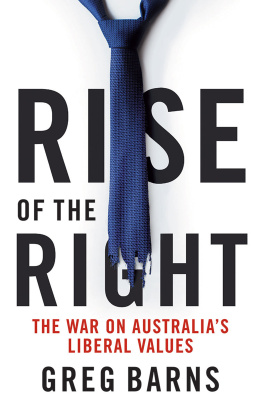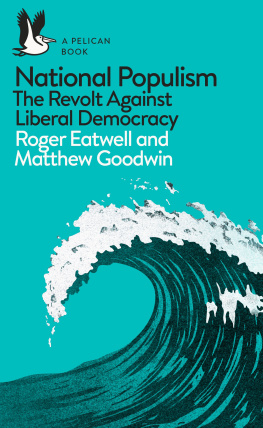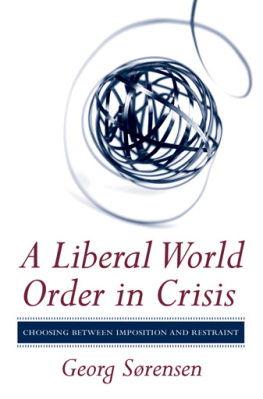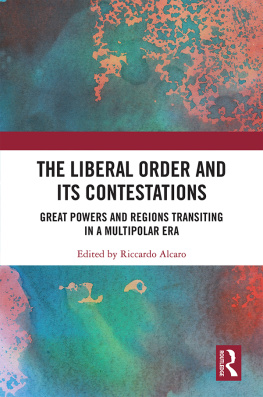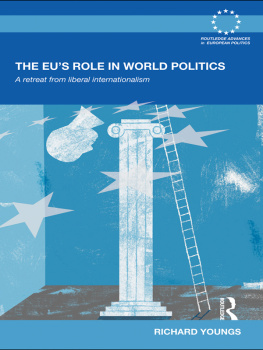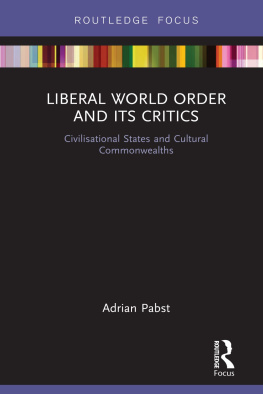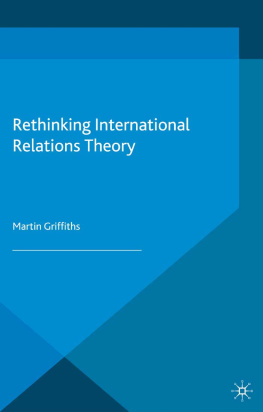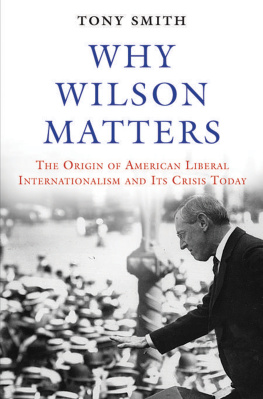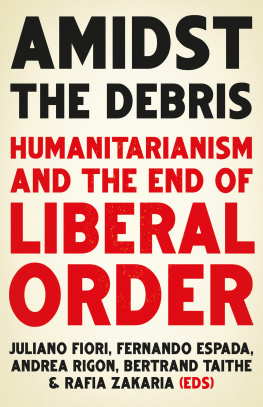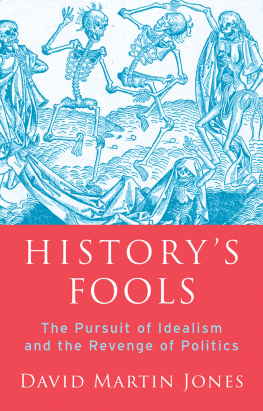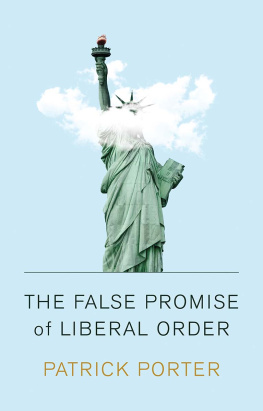A WORLD SAFE FOR DEMOCRACY
POLITICS AND CULTURE
James Davison Hunter and John M. Owen IV, Series Editors
The Trouble with History, by Adam Michnik (2014)
Anti-Pluralism, by William A. Galston (2018)
Why Liberalism Failed, by Patrick J. Deneen (2018)
A World Safe for Democracy
Liberal Internationalism and the Crises of Global Order
G. JOHN IKENBERRY

Published with the assistance of the Institute for Advanced Studies in Culture, University of Virginia, and with assistance from the foundation established in memory of Calvin Chapin of the Class of 1788, Yale College.
Copyright 2020 by G. John Ikenberry.
All rights reserved.
This book may not be reproduced, in whole or in part, including illustrations, in any form (beyond that copying permitted by Sections 107 and 108 of the U.S. Copyright Law and except by reviewers for the public press), without written permission from the publishers.
Yale University Press books may be purchased in quantity for educational, business, or promotional use. For information, please e-mail (U.K. office).
Set in Electra type by Westchester Publishing Services.
Printed in the United States of America.
Library of Congress Control Number: 2020936946
ISBN 978-0-300-23098-7 (hardcover: alk. paper)
A catalogue record for this book is available from the British Library.
This paper meets the requirements of ANSI/NISO Z39.48-1992 (Permanence of Paper).
10 9 8 7 6 5 4 3 2 1
To Lidia, Jackson,
and the loving memory of Tessa
fiat lux
I will begin by speaking about our ancestors, since it is only right and proper on such an occasion to pay them the honor of recalling what they did. In this land of ours there have always been the same people living from generation to generation until now, and they, by their courage and their virtues, have handed it on to us, a free country. They certainly deserve our praise.
Pericles Funeral Oration, as recorded by Thucydides
Come, my friends,
Tis not too late to seek a newer world.
...............................
Tho much is taken, much abides; and tho
We are not now that strength which in old days
Moved earth and heaven, that which we are, we are;
One equal temper of heroic hearts,
Made weak by time and fate, but strong in will
To strive, to seek, to find, and not to yield.
Alfred, Lord Tennyson, Ulysses, 1833
We are living and shall live all our lives now in a revolutionary world. This means among other things a world of restless experiment.
Walter Lippmann, New Republic, April 1917
The world goes a little by peaks and valleys, but on the whole the curve is upward; on the whole,... over these thousands of years human life is on a great deal better scale than it was then.
Franklin Delano Roosevelt, press conference, 22 December 1944
CONTENTS
PREFACE
On 2 April 1917, President Woodrow Wilson went before Congress to call for a declaration of war against imperial Germany, proclaiming as the wars purpose that the world be made safe for democracy. These famous words are widely seen to embody the essence of liberal internationalism. The phrase is typically understood as an idealist appeal to spread democracy worldwide. Wilson seemed to be calling for a great campaign to remake the world in Americas image and bring the blessing of democracy to all corners of the earth. This is how his wordsand liberal internationalismhave been handed down to us.
But the statement can also be read literally, as a plea for safety. Rather than an idealist appeal, it is a call to reform the postwar international order so as to allow Western liberal democracy to survive. If the United States, western Europe, and other established democracies hope to protect their democratic institutions and traditions, Wilson is saying, they must reorganize the international setting in which they live. This is a very different take on Wilsons intent. He is calling on us to confront the dangers that imperil the survival of democracy, not to promote it on distant shores. As I argue in this book, this second reading best captures the longer tradition of liberal internationalism, which begins a century before Wilson and unfolds in the century after him. The essential element and guiding impulse of this tradition is the cooperative organization and reform of international order so as to protect and facilitate the security, welfare, and progress of liberal democracyin short, to make the world safe for democracy.
A century after Wilson, people across the liberal democratic world are again worried about whether their way of life can be made safe, and even whether it will survive. Great powersChina and Russiaare offering forceful illiberal challenges to the Western liberal order. Equally profound challenges are coming from within the liberal democratic world itselfreactionary nationalism, populist authoritarianism, and attacks on openness and the rule of law. Todays liberal internationalists are once again forced to return to the most basic questions. What are the prospects for liberal democracy? How can capitalism and liberal democracy be reconciled, reformed, and put on a solid foundation? How can the conflicting values at the heart of liberal orderliberty and equality, openness and social solidarity, sovereignty and interdependencebe brought back into balance? Most important, in our unraveling world order, is there a future for liberal internationalism as a way of organizing global relations and making the world safe for democracy? On what geopolitical and intellectual foundation can liberal internationalism plant its flag?
In grappling with these questions, I take the long road: looking back at the crooked trajectory of liberal internationalisms long and uncertain passage to the twenty-first century. This book recounts two centuries of its rise, spread, crises, and transformation. Liberal internationalism can be understood as a cluster of ideas on how to think about and act in the world, which emerged out of the Enlightenment and the Western liberal democratic experience. In the twentieth century it became a political project. At its core are convictions about how liberal democraciesand the wider worldshould cooperate to organize their common relations. Liberal internationalists see cooperation driven by shared values and interests, but this cooperation is also a defense against the existential dangers and mutual vulnerabilities that arise out of modernity itself. It is this impulsea response to the dangers and vulnerabilities that come with the rise of modernization and interdependencethat I emphasize in this portrait of the liberal international project.
Liberal internationalism is not in its essence a utopian project to make the world a better place. It is a pragmatic, opportunistic, and reform-oriented approach aimed at making safe liberal democracy in a world that is riven by tyranny, brutality, and intolerance. To be sure, Enlightenment sensibilities and progressive narratives of Western society lurk at the heart of the liberal tradition. But liberal internationalists actually have quite diverse views about modernity, and their ideas and projects over the past two centuries tend to reflect a surprisingly practical, even world-weary cast of mind. Progress is possible but not inevitable. Modernity has a split personality: the modern world is continuously creating capacities for great advances in human welfare but also for monumental disaster and civilizational catastrophe. Liberal internationalists share with political realiststheir great intellectual rivalsa suspicion of the power-seeking and despotic aspects of human nature. This is why they view constitutions, legal restraints, and institutional checks and balances as essential features of political order. Unlike realists, who see cycles of power and order across history, liberal internationalists are heirs of the Enlightenment project of scientific and technological advance and societal transformation that open new possibilities for both progress and disaster. Liberal internationalism is a cluster of ideas about how to build world orderstarting with the liberal democraciesto realize the gains from modernity and guard against its dangers.
Next page

